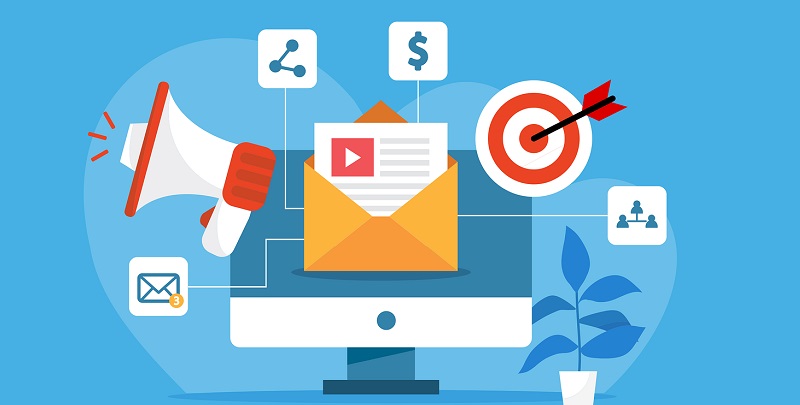In today’s digital age, email marketing software has become a powerful tool for small businesses. It offers an affordable and efficient way to communicate with customers, build brand loyalty, and drive sales. However, many small business owners often overlook the potential of email marketing and fail to realize the impressive results it can deliver.
Utilizing email marketing data
One of the key aspects of successful email marketing is using data to learn more about your subscribers. By analyzing email marketing data, you can gain valuable insights into their preferences, behaviors, and interests. This information allows you to tailor your email campaigns and adjust your strategy according to your findings. For instance, if you discover that a certain segment of your subscribers is more responsive to promotional offers, you can focus on creating targeted campaigns to maximize conversions.
Enhancing Social Sharing
Incorporating social sharing options in your email marketing strategy is crucial to expanding your reach and increasing engagement. Give your subscribers an easy and immediate way to share your email content on their social networks. By including social sharing buttons in your emails, you can amplify your message and grow your audience. Research shows that emails with social sharing buttons achieve click-through rates that are 158% higher than those without them. So, don’t miss out on the opportunity to leverage social media to enhance the effectiveness of your email campaigns.
A/B Testing for Optimization
To continuously optimize your email campaigns and improve results, A/B testing is a valuable technique. By creating multiple versions of your emails and testing different elements such as subject lines, call-to-action buttons, or visuals, you can determine what resonates best with your audience. This data-driven approach allows you to make informed decisions about your email content and design, ultimately leading to higher engagement and conversion rates.
The Power of Personalization
Personalization is key to capturing your subscribers’ attention and enhancing the effectiveness of your email campaigns. Addressing your subscribers by their names and tailoring the content to their specific interests make them feel valued and understood. Through personalization, you can create a more meaningful connection with your audience and strengthen brand loyalty.
Benefits of segmentation include
Targeted Marketing: By dividing a larger market into smaller segments, businesses can tailor their marketing messages and strategies to specific customer groups. This allows for more personalized and effective communication, leading to higher response rates and conversion rates.
Improved Customer Satisfaction: Segmentation allows businesses to understand their customers’ specific needs, preferences, and behaviors. By catering to these unique characteristics, businesses can deliver products and services that better meet customer expectations, resulting in improved customer satisfaction and loyalty.
Resource Optimization: Segmentation helps businesses allocate their resources more efficiently. Instead of treating all customers the same, businesses can focus their efforts and resources on the most profitable and high-potential segments. This leads to cost savings and increased return on investment.
Competitive Advantage: Businesses that effectively segment their target markets gain a competitive advantage over those that do not. By understanding customer segments better, businesses can develop unique value propositions, differentiate themselves from competitors, and capture a larger share of the market.
Market Opportunity Identification
Segmentation allows businesses to identify untapped market opportunities and niche segments. By analyzing market data and trends, businesses can discover new customer segments that have unique needs but are currently underserved. This opens up new avenues for growth and expansion.
Segmentation is another powerful strategy to increase engagement and conversions in email marketing. By dividing your subscriber list into smaller segments based on factors like demographics, behavior, or purchase history, you can send more relevant and targeted content. This personalized approach resonates better with your audience, leading to higher open rates and click-through rates. For example, if you have a clothing store, segmenting your subscribers by gender can enable you to send tailored emails with product recommendations that are more likely to drive sales.
Enticing recipients with personalized content
Crafting compelling subject lines and preheaders is vital in enticing recipients to open your emails. Personalized subject lines, tailored to each subscriber’s preferences or past interactions, grab their attention and make them more likely to engage with your message. Furthermore, adding preheaders that provide a preview of what’s inside the email can further entice recipients to open and explore its content.
Building trust through permission-based marketing
Permission-based marketing plays a critical role in building trust and ensuring engagement from genuinely interested recipients. It involves obtaining explicit permission from individuals before adding them to your email list. By implementing opt-in forms and clearly explaining the value they will receive by subscribing, you can attract subscribers who are genuinely interested in your offerings. This not only helps you maintain a healthy email list of engaged users but also establishes trust and credibility with your audience.
Email marketing is a powerful tool for small businesses, but it requires a strategic approach to maximize its effectiveness. By using email marketing data, enhancing social sharing, conducting A/B testing, implementing personalization, utilizing segmentation, and adopting permission-based marketing practices, you can significantly enhance engagement and drive better results. Remember, email marketing is not a one-size-fits-all strategy. Experiment, analyze data, and refine your approach to meet the unique needs and preferences of your audience. With the right strategies in place, you can unlock the true potential of email marketing for your small business.

